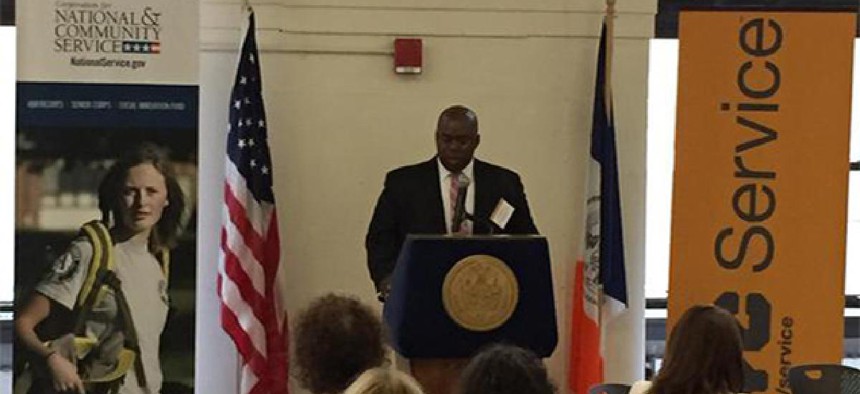NYC Service Unveils Expansion of Programs and Employment Opportunities at Second Annual Summit

At its second annual NYC Service Summit on Thursday, NYC Service convened leaders from across the nonprofit, government, and foundation sectors to announce an ambitious expansion of its NYC Service Year program, a fellowship available to recent college graduates, as well as increased employment opportunities for alums of national service organizations.
Commencing the summit with words made famous by Martin Luther King, Jr.—“Everybody can be great because anybody can serve”—Paula Gavin, chief service officer of NYC Service, outlined increased partnerships with local agencies which aim to “create new and high-impact service year programs that mobilize New York young adults to serve their city.”
The expansion program, which was designed in partnership with United Way of New York City and the Franklin Project of the Aspen Institute, entails doubling the total amount of service year opportunities available in the city from 5,000 to 10,000 by 2020. Eight city agencies—Administration for Children’s Services, Department for the Aging, Department of Health and Mental Hygiene, Department of Probation, Human Resources Administration, Small Business Services, and Young Men’s Initiative—have committed to creating specific service opportunities within their agencies. Supportive funding has also been secured from the Citi Foundation ($250,000 donation), the Laurie M. Tisch Illumination Fund ($100,000 donation), and the UJA-Federation of New York ($30,000 donation).
Also announced was an official commitment from New York City government agencies to become “employers of national service,” giving preferential consideration to candidates who have served in national service organizations such as AmeriCorps and the Peace Corps, and urging both nonprofit and for-profit organizations in New York City to follow suit.
Richard Buery, deputy mayor for strategic policy initiatives, announced the commitment on behalf of the de Blasio administration, citing his own adolescent volunteer work—which he credited with putting him on a path towards a career in public service—as inspiration for supporting the initiative.
“Volunteering taught me that if you see something in your community that is unjust and makes you angry, you don’t just think about it. You can do something about it,” Buery said.
Buery posited that the skill set offered by service organization alums naturally lends itself to work in city government, as service “instills values of leadership and team building.”
“You will not find a more talented or committed group of individuals than AmeriCorps and Peace Corps alums,” Buery added.
Wendy Spencer, chief executive officer of the Corporation for National and Community Service, the federal agency that administers AmeriCorps, SeniorCorps, and other service programs, also addressed the summit, praising New York City’s decision to become an employer of national service.
“This is a big step and a smart step for the city of New York to say, we’re going to aggressively recruit alum from AmeriCorp and Peace Corps to come and serve in our organizations, because we want to find people who truly care about the public good,” Spencer said.
Spencer also expressed hope that the expansion of service opportunities within city agencies would not only provide opportunities for individuals, but would have a lasting impact on overall advocacy in New York City.
“City work doesn’t have to be isolated to just the professionals in city government,” Spencer said. “We should expand the opportunities beyond the doors of just the employees so that city volunteers—who are going to give a year of their life—can clearly understand what it’s like to operate city government, and what is needed.”
“These people will ultimately go on to become advocates after their year of service for many of the causes that the city cares about,” Spencer added.
The summit also provided an opportunity for attendees—including senior leadership of organizations such as United Neighborhood Houses, New York Cares, The Fortune Society, and Teach for America-New York City—to engage directly with the commissioners of participating city agencies, offering their thoughts on strategies for attracting more volunteers and crafting the most meaningful experiences.
Cindy Ji, a University of Chicago student and intern at United Neighborhood Houses, said that outreach efforts should combat misconceptions about volunteer work amongst “millennials.”
“I think it’s important to reach people who want to serve but think of community service as simply picking up trash. It’s important to engage them and show them what a future in service can really look like,” Ji said.
Many participants, including Yasmeen Shaheen-McConnell, program manager of the Franklin Project, highlighted the unique opportunity presented by New York City’s sizable immigrant population.
“It is important for immigrants to not just be the receivers of services, but the givers, empowering them in their own communities,” Shaheen-McConnell said.
The most prevalent theme, however, was volunteerism’s ability to give individuals inspiration, which Mitchell J. Silver, commissioner of the New York City Department of Parks and Recreation, stressed as the most important element to highlight in outreach efforts.
“The most important thing is giving someone a sense of purpose,” Silver said. “One of the amazing things about the young people of this generation is how much they desire that—if it isn’t meaningful, they’ll walk.”
